

AAAS Fellow, elected 2015
Illinois Community College Trustees Association Faculty of the Year, 2015
Waubonsee Community College Faculty of the Year, 2021
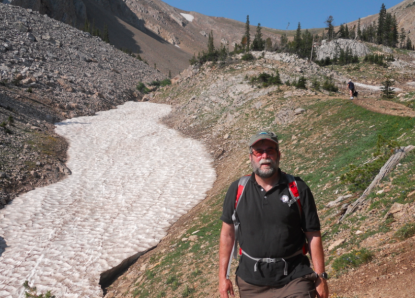
My primary professional interests are in geoscience education. I want to bring as much of the vastness and complexity of the earth to my students both in and out of class. I am also passionate about helping my students become the best students that they can. As part of that, I am involved in several projects that are trying to reach out to, not only my students, but also the Waubonsee community.

I am passionate about making sure that each and every student excels in my class, whether they are going to be geoscientists or are taking a class for distribution requirements. I bring into my classes teaching strategies that promote student engagement, increase student metacognition, and address implicit and cultural biases. I also bring research activities to my classes and encourage my students to conduct research, wherever possible.
I was part of the SAGE 2YC Faculty as Change Agents program, in which I brought change to my classes, geoscience classes at Waubonsee Community College and to geoscience classes in IL. I shared this with other faculty at Waubonsee. As a change agent, I brought data-driven pedagogies to my students, such as metacognition, active learning and science identity to increase their success to entice them to enter the geosciences as a career. I continue to bring these, and many other changes to my students in order to make them the very best student they can be.
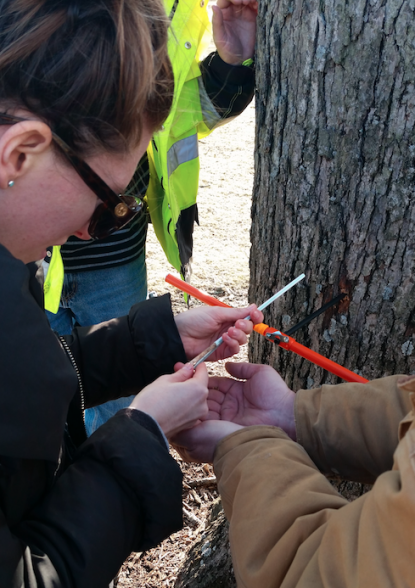
I am interested in the issue of sustainablity, and improving the sustainability of myself, my stidents, and the Waubonsee community. I gave a presentation in our Asset Earth series on sustainability (see link).
I am very active in promoting geosciences at Two-Year Colleges around the country. I have served on several committees to advocate for the support of geoscience education at 2YC, such as the National Science Foundation Advisory Committee for the Geosciences, IRIS Education and Outreach Standing Committee, and many associated with the Geological Society of America
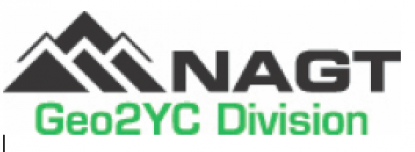
I was the first President of Geo2YC, in 2011 -2012, the first Division of the National Association of Geoscience Teachers (NAGT).
Our Mission statement
Geo2YC, an organization within the National Association of Geoscience Teachers, exists to provide:
• a forum for exchanging ideas, concerns, resources, and information about two-year college geoscience programs
• a network for full-time and part-time/adjunct faculty to improve geoscience instruction at two-year colleges and comparable undergraduate instruction at four-year institutions
• a vehicle for making recommendations to the NAGT Council and membership on activities of special interest and benefit to two-year college geoscience faculty, staff, administrators, and students
• curricular and technological pathways that will produce successful geoscience majors, qualified geoscience technicians, and geoscience-literate citizens.
• collaboration and support for research in two-year college geoscience education.
• a focal point for communication and advocacy for two-year college geoscience education within NAGT and with other professional organizations
Please contact me if you want more information, or would like to join the Geo2YC Division.
Other stuff
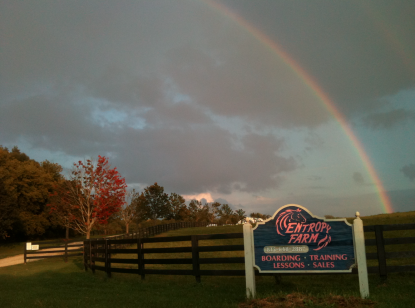
I live northeast of Woodstock, IL (home of the movie Groundhog Day, with Bill Murray) on a horse boarding and traning facility called Entropy Farm, which is owned and operated by my wife and myself. Go to the Entropy Farm Facebook page, and 'Like' it for updates and pictures of foals and fun.
I was part of the WE Talks at Waubonsee, which is a series of presentations by Waubonsee faculty and staff on subjects that they are passionate about, in a TED talk style. Here is my WE talk on "Why Geology?"
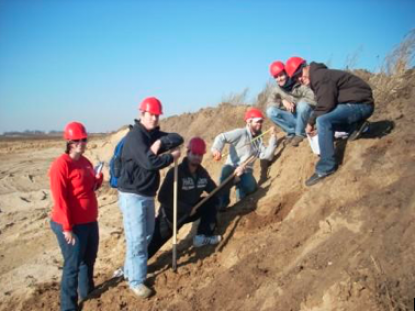
ESC100: Survey of Earth Science
This 3 credit course is designed so the student will demonstrate a familiarity with the basic vocabulary of meteorology, geology, and some oceanography. The student will demonstrate an ability to examine earth science information through critical reading, writing, and discussion. In doing so, the student will realize the wonders and complexities of the fragile Planet Earth upon which they are a steward. The student will be able to more fully understand the stewardship role they are undertaking by developing an understanding of the geologic concepts and data that are at the core of current discussions of topics such as climate change, environmental hazards, and sustainable resource management. Specific objective sheets will be distributed which should be used as study guides for exams. IAI: P1905
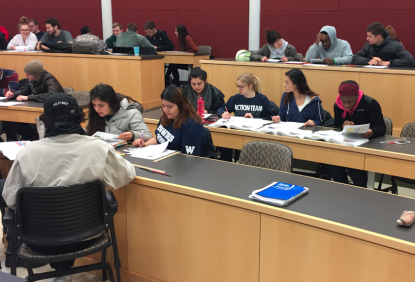
AST100: Introduction to Astronomy
This 3 credit course is designed so the student will demonstrate a familiarity with the basic vocabulary and concepts of modern astronomy. The student will demonstrate an ability to examine astronomic information through critical reading, writing, and discussion. Through an understanding of ideas and concepts in astronomy, the student will be able to more fully understand the complexities of one of the fundamental questions of humankind: What was the beginning of the universe like? Along the way, students will discover the contents and composition of our solar system, our own galaxy, and some of the galaxies in the great beyond, and perhaps beyond the edge. Specific objective sheets for each exam will be distributed, which should be used as a study guide. IAI: P1 906
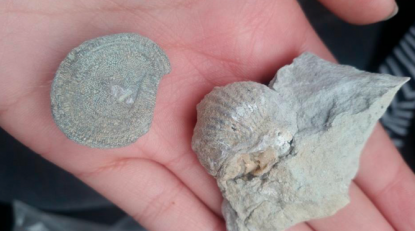
GLG100: Introduction to Physical Geology
This 3 credit course is designed so the student will demonstrate a familiarity with the concepts and basic vocabulary of physical geology. The student will demonstrate an ability to examine geological information through critical reading, writing, and discussion. The student will gain an appreciation of the geologic materials and processes that govern, and have governed their familiar physical landscape. Specific objective sheets will be distributed which should be used as study guides for exams. IAI: P1 907
GLG101: Introduction to Physical Geology Laboratory
A laboratory course meant to be taken concurrently with Introduction to Physical Geology (GLG 100). Weekly laboratory work will involve mineral and rock identification, topographic and geologic map exercises, and some field work. IAI P1 907L
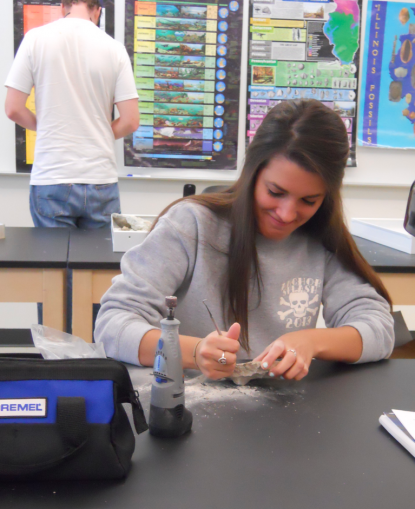
This course is an introduction to the origin and structure of the earth through a study of the evolution of its life and continents over the last 4.6 billion years. Emphasis is placed on the formation and interpretation of sedimentary rocks for the purpose of understanding how they, and the fossils contained within them, record changes in the Earth’s environment and processes over time. Plate tectonics and extinctions recorded in rocks are studied to understand how they reflect environmental changes in the Earth's ocean, atmosphere, and surface. Required field trips are an integral part of the course. IAI: P1 907L
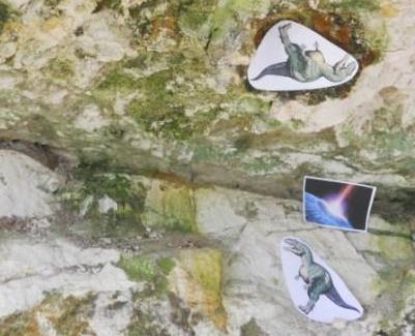
This course is intended to address issues that have not traditionally been considered in most environmental discussions. In so doing, this course will contribute to a better trained environmental scientist, a more informed student, and future elector to be able to solve critical local and global environmental issues in the new millennium. These issues include recognition and mitigation of geologic hazards (floods, landslides, subsidence, earthquakes, and volcanoes), groundwater contamination, the source and supply of energy and mineral resources, as well as global warming and climate change. IAI: P1 908

GLG120 Geology of the National Parks
Geology of the National Parks develops geological background, concepts and principles through the study of selected national parks. Students articulate the reasons why sites are designated as national parks, monuments, and seashores and the role that geology has in determining that status. Basic geologic concepts discussed are minerals, rocks, geologic time, sedimentary environments and rivers, plate tectonics, volcanoes, weathering, mass wasting, earthquakes, and glaciers and glaciation. Human interactions and archeology are presented where appropriate. IAI: P1 907
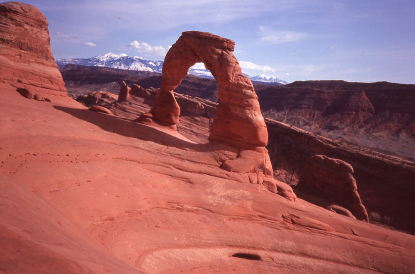
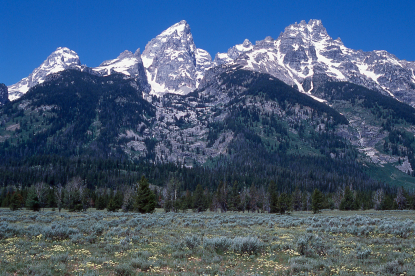
Asset Earth is a series of presentations by scientific experts on current scientific thought and events. They are selected, both topic and speaker, to be able to present scientific ideas and concepts about the planet upon which we live in a non-threatening, informative and entertaining presentation. Topics for presentations are wide ranging, and include anything that cover any scientific aspect of the earth, how it works, and human interactions with it. If you have an idea for a presentation, please contact me for further information.
Most of the presentations are on Thursday evenings at 7 PM in the Auditorium on the Sugar Grove Campus, and all are free to all.
Our current schedule of upcoming presentations (all at 7 PM in the Auditorium)
Here is a list of our previous presentations (BOLD = presentation available online at mymedia.waubonsee.edu)
Date - Speaker(s) - Affiliation - Title
13 Sep 2006 Dr. Seth Stein IRIS / Northwestern University - Giant earthquakes: Why, where, when and what we can do
9 Feb 2007 Karl Schulze, Dave Voorhees, Chris Hooker and Dan Ward - Waubonsee Community College - “Global Warming: An Inconvenient Truth” and panel discussion
24 Feb 2007 Brian Ekdal - Waubonsee Community College - 10 Days in Malawi16 Mar 2007 Karl Schulze - Waubonsee Community College - Tornadoes: Lessons Learned from a Storm Chaser
18 Apr 2007 Kathleen Westman & Jim Powell - Waubonsee Community College and Red Cross - New Orleans: Reclaim or Rebuild?
24 Oct 2007 Dr. Brian Atwater- IRIS / University of Washington - The Orphan Tsunami of 1700 - A Trans-Pacific Detective Story
27 Feb 2008 David Voorhees - Waubonsee Community College - Global Climate Change and the IPCC
17 Apr 2008 Dr. Paul Loubere - Northern IL University - Waterworld: Global Oceans, Ice and Climate Change
1 May 2008 Dr. David Goldblum - Northern IL University - Slowing Climate Change: Our Responsibility, Our Options
18 Oct 2008 Second Annual Renewable Energy Fair
13 Nov 2008 Multiple speakers - Multiple affliations - “Flock of Dodos: The Evolution – Intelligent Design Circus” and panel discussion
12 Feb 2009 Brian “Fox” Ellis - Charles Darwin and the Voyage of the Beagle
10 Sep 2009 Joe DalSanto - Waubonsee Community College - The space shuttle
1 Oct 2009 Dr. Jason Steffen - FERMI and Waubonsee Community College - Finding other Earths
12 Nov 2009 Dr. Leon Lederman - FERMI - Telescopes and Microscopes: Tools and What We Know About the World
18 Feb 2010 Dr. Paul Nelson (Biola Univ)/Dr. Andrew Petto (Univ of Wisconsin, Milwaukee) - “Unlocking the Mysteries of Life” and panel discussion
27 Mar 2010 Capt Jon McBride - NASA - To Outer Space and Back
8 Apr 2010 Sallie Greenberg - Illinois State Geological Survey - Carbon Capture and Storage in the Illinois Basin
30 Sep 2010 Dr. Stephen Malone - IRIS / University of Washington - Predicting earthquakes and volcanic eruptions
11 Nov 2010 David Voorhees - Waubonsee Community College - What Is Sustainability and How Can You Live a Sustainable Life?
10 Mar 2011 Danielle DuCharme - Waubonsee Community College - Insects and Spiders: The Good, the Bad, and the Weird
3 Nov 2011 David H. Voorhees, Associate Professor of Earth Science and Geology, Waubonsee Community College, New Madrid Seismic Zone: What have we learned in 200 years?
1 Mar 2012 Karl Schulze, Instructor Waubonsee Community College, Tornadoes and Storm Chasing
20 Sep 2012 William Kreznor, Soil and Environmental Consultant, Almost flat is where it's at: Soils and glaciated landscapes of Northeastern Illinois
11 Oct 2012 Alfred Weiss, Instructor, Waubonsee Community College, The World through maps: Eye on the world using Geographic Information Systems
21 Feb 2013 Dani DuCharme, Assistant Professor Biology, Waubonsee Community College, Biodiversity-Can't live with it and can't live without it
19 September 2013: Melissa E. Lenczewski, Northern Illinois University, Associate Professor, Geology and Environmental Geosciences, Paradise Lost: Impact of Tourism on water quality in Cancun, Mexico
7 November 2013: Todd Laufenberg, Assistant Professor of English, Waubonsee Community College: It's All Greek to Me; The Rhetoric of Scientific Debate
13 February 2014: Amy Del Medico, Associate Professor of Mathematics, Waubonsee Community College: What's A Fractal?
6 March 2014: Megan Dunning, Manager of Community Education and Outreach, Morton Arboretum: 101 degrees in the Shade: Climate Change and Your Garden
16 October 2014 Keith Bickley - Waubonsee Community College - Is philosophy still important to STEM?
6 November 2014 Dr. Chris Widga - Illinois State Museum - The Big Deal about Big Game: Early Paleoindian use of Late Pleistocene Megafauna
12 February 2015 David Dolek - Columbia College - Geology as destiny; Across teh Chicago Portage and Mid-Continent Divide
2 April 2015 Justin Hoshaw - Waubonsee Community College - Organic vs. GMO: What's in your belly?
24 Sep 2015 Dr Ross Powell, Northern Illinois University, Exploring 'new' environments on Earth
12 Nov 2015 Justin Hoshaw, Waubonsee Community College, What science can teach you about dating, love and sex (that sex ed did not)
11 Feb 2016 Sowjanya Dharmasankar, Nancy Christensen, Sheela Vemu, Heather LaCost, Waubonsee Community College, The Many Aspects of Love
3 Mar 2016 Chris Cunningham Waubonsee Community College, Human vision and impossible colors
14 Apr 2016 Dan Ward Waubonsee Community College, What is Science?
22 Sep 2016 Dr Lydia Finney, Dr Carmen Soriano, Argonne National Laboratory, X-Ray imaging at Argonne National Laboratory: The Case of the Tully Monster Fossil
27 Oct 2016 Dr Pratima Jindal, Waubonsee Community College, Gravitational Waves: What their discovery means for us
30 Mar 2017 Dr. Victor Gensini, College of DuPage, Tornadoes: Past, Present and Future
28 Sep 2017 Dr Reed Scherer, Northern Illinois University, Paleoclimatology: What's past may not be prologue
22 Feb 2018 Dr Steven Frankel, Northeastern Illinois University, Plants are better than us: how plants are better at just about everything than humans
18 Oct 2018, Dr Dan Hooper, Fermi National Accelerator Laboratory, Radically rethinking dark matter
7 Mar 2019, Joe Dal Santo, College of DuPage, The view from Earth: 400 years of astronomical discovery.
24 October 2019 Mike Phillips, Illinois Valley Community College, An Expedition to the Capital: Working with Lawmakers to Ensure Legislation Incorporates the Geoscience Prospective
14 November 2019 Michael Wilson, Waubonsee Community College, Eclipses: The Myths and Magic Behind Nature's Perfect Alignment
12 March 2020 Karl Schulze, The Art and Science of Weather Forecasting
23 April 2020 Jennifer Jarland, Recycling Program Coordinator, Kane County, Rethink, Reduce, Reuse and Recycle Right!
Asset Earth is currently in hiatus due to the pandemic and the elimination of the Community Education Department at Waubonsee Community College
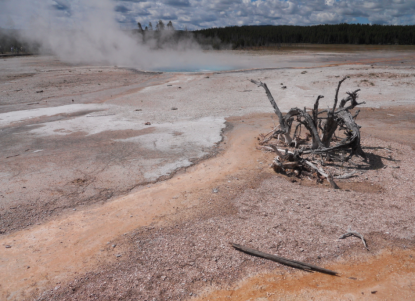

Bringing cutting-edge scientific research into classrooms is pedagogically effective, fun and inspirational for students. Most obstacles to bringing research into classrooms involve identifying appropriate research topics and samples, and many times the samples involve specialized or expensive equipment. The Aurora Mastodont Project (AMP) can provide an opportunity to bring authentic research into your Middle School, High School and College classrooms or labs with limited logistics. We will send to your classroom, free of charge, a sample of screenwash to be analyzed and processed by your students.
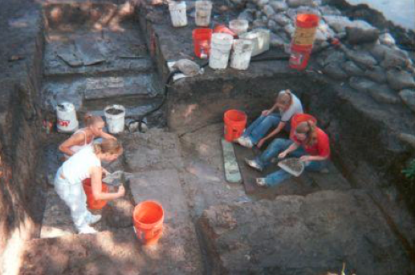
The 2004 AMP was a joint project between the City of Aurora, the Illinois State Museum and Waubonsee Community College to uncover a (rumored) fourth mastodont skull left after multiple mastodont remains were discovered in the 1930’s by the Civil Works Administration (3 skulls, 1 jaw, 3 tusks, 3 ribs, 1 scapula, 1 ulna, 1 femur, toe bones, 1 set of articulated cervical vertebrae, 1 set of articulated thoracic vertebrae). The 2004 AMP did not recover any additional mastodont remains, but it did illustrate the scientific and pedagogic importance of the Aurora Mastodonts. One of the many results of the 2004 AMP was that we now have significant quantities of sediment (screenwash) from the layer that the original mastodonts were discovered in that was systematically excavated, washed, and recorded, thereby retaining its stratigraphic control. This screenwash contains small bones, snails, plants, and other debris. Small screenwash samples (approximately 50 ml) will be sent to your classroom for sorting and description, engaging students as collaborators in site interpretation of the project. This project is contributing to the current research into climate change during the most recent glaciation 30,000 to 10,000 years ago, and extinct Midwestern megafauna. Analyses of the processed screenwash can incorporate data processing and analysis techniques, as well as interpretation of Illinois and Midwest climates, and discussion of the broader global conditions using lesson plans that are provided below.
Here are some instructions for processing and sorting the screenwash
Click on this link(https://docs.google.com/open?id=0B8pb9OG_pWR9ZGJiNjIzYmQtNTI2OS00YWEwLW…) to go to Google Docs to download a powerpoint presentation on AMP - MAP that you may use in your class. When the window opens, open the file "AMPMAP_Intro" and click on the "Download original" in the right corner.
We have provided a teachers guide, which contains a series of lesson plans and a detailed set of instructions and background information for processing and sorting the screenwash.
Here is a chart of the Next Generation Science Standards (NGSS) that can be achieved in your Middle School or High School classes.
Here is a lab exercise that has been used by one of the organizers (DV) in his college level Earth Science and Geology labs. Please feel free to modify it to suit your pedagogic goals. This is based upon a collaboration with Karen Kortz, from the Community College of Rhode Island.
The data generated by your students wil be recorded in the form that is in the instructions that is also at the end of the lab (above), which you will send back with the sorted sample. Your students data will also be added to our database( http://www.livebinders.com/play/play/627554) so that they can compare their results to colleagues around the country.
When you are finished with the project, please complete an evaluation form that is in the instructions file, and send in with your processed screenwash.
There is no fee for participating in this project. We only ask that you have fun with your students, send the sorted screenwash, sample log, and evaluation form back to us, and that you pay for the return postage. If you find that this is a useful project in your classes, and you would like to repeat it in subsequent semesters, please let us know, and we will send more screenwash out to you.
To participate:
1) Determine how many students you want to participate
2) Determine how long you would like each student to participate
3) Contact David Voorhees with the above information. Experience has shown that a 50 ml vial will keep 4 students busy for about 2 hours.
Additional resources
We presented a poster
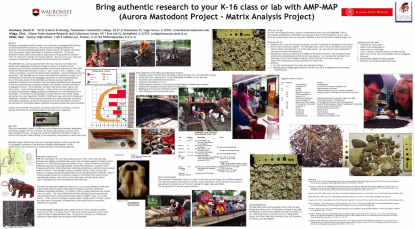
at the Geological Society of Americaconferenence in Minneapolis, MN on 11 October 2011
We had a workshop (P85) at the Illinois Science Teachers Associationmeeting on 29 October 2011
Here is a species list of gastropods (snails) that you will see. You can use this for deeper ecologic and paleoenvironmental study.
Here is a list of macrobotanicals (plants) that have been identified. You can use this for deeper ecologic and paleoenvironmental study.
INSERT DHV_Screenwash
Bag of screen wash from the 2004 dig
Thank you for your interest and participation in this exciting project.
Earth Science & Geology
Waubonsee Community College
Rt 47 @ Waubonsee Dr,
Sugar Grove, IL 60554,
630.466.2783
Pontiac High School
1100 E Indiana Ave
Pontiac, IL 61764
Summer 2021
By appointment
Fall 2021
TBD
David Hillyer Voorhees
Professor of Earth Science and Geology
Waubonsee Community College Phone: 630.466.2783
Rt 47 at Waubonsee Drive Email: dvoorhees@waubonsee.edu
Sugar Grove, IL 60554 WWW: https://www.waubonsee.edu/voorhees-david
Summary of Qualifications
• Taught Earth Science, Geology, and Astronomy at Waubonsee Community College since 2002. Taught Physical Geology and Earth Science at 2 other Illinois Community Colleges for 5 years and various geology discussion sections and labs at the University of Illinois.
• Passionate advocate for scientific literacy in and out of the classroom; including the development of programs at Waubonsee Community College using public lectures and earthquakes.
• Coursework and research for a Ph.D. degree in geology (ABD), specializing in glacial geology, geomorphology, and sedimentology, with supplemental coursework in hydrology and soils.
• Seven years’ experience as an Exploration Geologist for two major oil companies
Education
Ph.D.: Geology University of Illinois, Urbana, Illinois: (ABD)
Dissertation: Stone bed sedimentology and petrography of Wisconsinan tills used to infer subglacial bed conditions in Northern Illinois.
M.S.: Geology Rensselaer Polytechnic Institute, Troy, New York: 1983
Thesis: The Stratigraphy and Sedimentary Petrography of the Oriskany Sandstone in Eastern New York State.
B.A.: Economics University of Rochester: 1980
Professional Experience
Professor: Waubonsee Community College, 2018-present
Associate Professor: Waubonsee Community College: 2009-2018
Assistant Professor: Waubonsee Community College: 2008-2009
Instructor: Waubonsee Community College: 2002-2008; tenure effective in September 2005
Responsible for developing and teaching lecture and laboratories in Earth Science, Physical Geology, Historical Geology, Environmental Geology, Geology of the National Parks, Astronomy, Physical Geography, and Sustainability; in addition to curriculum development and community-based outreach activities for the geosciences and STEM in general. Manage and promote the Asset Earth lectures and the Aurora Mastodont Project – Matrix Analyses Project to Waubonsee students, faculty, staff and the Waubonsee Community at large. Secured and maintain Educational Affiliate membership to IRIS (Incorporated Research Institutes for Seismology). Cultivate, mentor, design and implement professional development opportunities in various topics to Waubonsee and geoscience colleagues at large. Service to multiple committees and organizations for Waubonsee and the geoscience community at large.
Interim Dean of Technology, Mathematics, and Physical Sciences Division: WCC, 5/05 to 9/05
Temporary position during national search for permanent candidate, responsible for scheduling of classes, personnel issues, and budgetary duties for the Division.
Adjunct Instructor: McHenry County College and College of Lake County: 1997-2002.
Taught lecture sections and laboratories in Earth Science, Physical Geology, and Environmental Geology.
Teaching Assistant: Department of Geology, University of Illinois: 1990-92, 1995-96.
8 semesters of teaching at the undergraduate level; 5 at the introductory level and 3 at the upper level. I was integral in the development and implementation of the material used in the introductory course, subsequently published by Ginn Press. I was ultimately Head TA, supervising 6 other TA's and over 450 students. I received 2 campus wide teaching awards for excellence, and 1 departmental award.
Exploration Geologist: Gulf Oil Corporation / Chevron U.S.A., New Orleans, LA: 1982-89.
Identified drillable oil and gas prospects in the Gulf of Mexico through interpretation of electric logs, reflection seismic data and reservoir parameters to assess structural /stratigraphic relationships and fluid content of both producing and potential petroleum reservoirs. Constructed detailed structural maps, isopachous maps and cross sections in a mature field to (1) discover overlooked potential in excess of 5 million barrels of oil and 16 billion cubic feet of gas, (2) drill and help design 8 wells, and (3) assist in a workover program to recover an additional 10 million barrels of oil (estimated). Recommended potential prospects to management through presentations and technical reports leading to the purchase of 5 leases for $5.3 million. Includes three years supervisory experience in well site evaluation.
Service Activities
Co-Research Scientist, Aurora Mastodont Project (2004).
Educational Affiliate representative to IRIS (Incorporated Research Institutes for Seismology) (2005 - present).
Illinois Representative to Central Section of the National Association of Geoscience Teachers (2005 - present).
National Science Foundation - Panel Review - Course, Curriculum, and Laboratory Improvement (CCLI) (July 2005).
Organizer and Coordinator of Asset Earth lectures at Waubonsee Community College (2006 - present).
Executive Board Member – Illinois Association of Geoscience Instructors (2007 – present).
Campus Representative to Geological Society of America (2008 – present).
Faculty Advisor to S.O.S. (Students Organizing Sustainability) student group at Waubonsee Community College (2009 - present).
Campus representative to American Geosciences Institute (2009 – present).
Campus representative to American Geophysical Union, including Heads and Chairs (2009 – present).
National Science Foundation – Panel Review - Climate Change Education Partnership Phase I (CCEP-I) (July 2010).
Co-Coordinator of the Aurora Mastodont Project – Matrix Analyses Project (AMP – MAP) (2011 - present).
President, Geo2YC Division of National Association of Geoscience Teachers (2011 – 2012).
Member - IRIS (Incorporated Research Institutes for Seismology) Education and Public Outreach Standing Committee (2012 - 2015).
National Science Foundation - Panel member of Committee Of Visitors FY2013, Directorate for Geosciences (GEO), Geosciences Education and Diversity (GEO E&D) Programs (May 2013).
Two-Year College faculty representative to Geological Society of America Education Committee (2013-2017).
Member of Advisory Committee to the Geosciences Directorate, National Science Foundation (2015 – 2017).
National Science Foundation - Panel member of Committee Of Visitors FY2016, Directorate for Geosciences (GEO), Education and Diversity (GEO E&D) and Polar Programs (May 2017).
Science Fair Judge for ‘Tectonic Tragedies Expo’ of the 5th and 6th grade science classes at Deerpath Middle School East (May 2017).
Co-Facilitator for the Association of College and University Educators (ACUE) Course in Effective Teaching Practices, Waubonsee Community College (2019 to 2021).
Judge for Celebrating High School Innovators Award, ISU (Spring 2020 and Spring 2021).
Scientific Interests
Geoscience education, scientific and geoscience literacy, Quaternary stratigraphy, sedimentology and landscapes, glacial geology and geomorphology; fluvial landscapes and environments and their relationships to environmental problems, and astronomy.
Honors, awards and grants
Campus wide list of teachers ranked as excellent by their students (Fall 1991, Fall 1992), Geology Department Outstanding Teaching Assistant (Fall 1992).
Sigma Xi Grant-in-Aid of Research (1982, 1995).
Sigma Gamma Epsilon, Geological Honor Society (1982).
Participation in Penrose Conference on Fractured Unlithified Aquitards: Origins and Transport Processes (1994).
Participation in the Technical Workshop on the Micromorphology of Glacial Deposits, Amsterdam, The Netherlands (1993).
Nominee for the Council for Advancement and Support of Education (CASE) U.S. Professors of the Year Award (2005).
Granted tenure, Waubonsee Community College (August 2005).
Promoted to Assistant Professor, Waubonsee Community College (August 2008).
Principal Investigator for Waubonsee Community College Center for Teaching, Learning and Technology, Innovation in Learning Grant, Using a fossil preparation lab to enhance student pathways to success (2006).
Promoted to Associate Professor (August 2009).
Facilitated NSF funding for Waubonsee Community College geology student Caroline Amelse to attend the National Conference of the Geological Society of America, Portland, OR (October 2009).
Participation in Pearson Publishers Geology Faculty Advisory Board to design Mastering Geology (2010).
Participation in the National Association of Geoscience Teachers / National Science Foundation sponsored workshop The Role of Two-Year Colleges in Geoscience Education and in Broadening Participation in the Geosciences: A Planning Workshop (June 2010).
Principal Investigator for the National Science Foundation grant to Waubonsee Community College Waubonsee Community College S-STEM Scholarship Program NSF DUE S-STEM 0965822 (August 2010 – July 2017).
Elected the first President of Geo2YC, the first Division of NAGT (November 2011).
Participation in the National Association of Geoscience Teachers / National Science Foundation sponsored workshop Preparing Students in Two-year Colleges for Geoscience Degrees and Careers (July 2012).
Participation in the National Association of Geoscience Teachers / National Science Foundation sponsored workshop Supporting Student Success in Geoscience at Two-year Colleges (July 2013).
Participation in the Summit on the Future of Geoscience Education, University of Texas, Austin (January 2014).
Representative to the Skyway STEM poster competition for Waubonsee Community College (2015 to present).
Elected as Fellow of the American Association for the Advancement of Science (AAAS) (2015).
Illinois Community College Trustees Association, Co-winner of Faculty of the Year (2015).
Invitation to participate in Geo-Needs, a workshop funded by the National Science Foundation (August 2015).
Selected as a Change Agent as part of nation-wide National Science Foundation funded SAGE 2YC: Faculty as Change Agents (2015 to 2019).
Promoted to Professor (August 2018).
Invitation to speak on “Geoscience in Two-Year Colleges” in the prestigious Pardee Symposium on “Fostering an Inclusive Academic Culture for the 21st Century: Advancing Policies, Departments, and Supporting Faculty to Address the Needs and Challenges for Building a Healthy Geoscience Enterprise,” Geological Society of America Annual Meeting (2019).
Selected as a Full-Time Faculty liaison to the Faculty Development and Engagement Office, Waubonsee Community College (2019-2021).
Selected as Waubonsee Community College Outstanding Faculty of the Year, 2021
Professional Organizations
Illinois Association of Geoscience Instructors, Executive Board (IAGI)
Illinois Science Teachers Association (ISTA)
National Association of Geoscience Teachers (NAGT)
National Earth Science Teachers Association (NESTA)
Geological Society of America (GSA)
Council on Undergraduate Research (CUR)
American Quaternary Association (AMQUA)
Astronomical Society of the Pacific (ASP)
Association of Ground Water Scientists and Engineers (AGWSE)
American Geophysical Union (AGU)
American Association of Petroleum Geologists (AAPG)
Applicable Training
Glacial Geology Innovative and Effective Teaching in the Geosciences
Quaternary Geology Ground Water Hydrology
Geomorphology Hydrogeologic Characterization of Aquifers
Fluvial Geomorphology Sedimentology
Soil Geomorphology Clay Mineralogy
Soil Mechanics Reservoir Engineering
Soil Survey of Illinois Basic Well Logging and Interpretation
Basic Production and Nuclear Logging Geophysics and Seismic Interpretation for Geologists
Exploration geophysics Seismic stratigraphy
Computer skills
Experience with
- EXCEL and Word since 1990.
- Powerpoint since 1997.
- Quicken and other business and accounting software since 1990.
- online teaching using WebCt (2008 to 2010), Blackboard (2010 to 2020), Canvas (2020 to present)
- Kaltura since 2016
- Canvas since 2020
Workshops as convenor or co-convenor
Co-Organizer, Illinois Association of Geoscience Instructors / Supporting and Advancing Geoscience Education in Two-year Colleges workshop: Preparing Students in Two-Year Colleges for Geoscience Degrees and Careers, Joliet Junior College (1 March 2013).
Co-Organizer, Supporting and Advancing Geoscience Education in Two-year Colleges workshop: Preparing Geoscience Students in Two-Year Colleges and for transfer, Illinois Valley Community College (27 March 2015).
Co-Organizer, If you can’t have the student with the skills you want, then engage the one you have, Faculty Roundtable workshop, Waubonsee Community College Orientation (August 2016).
Co-Organizer, Supporting and Advancing Geoscience Education in Two-year Colleges 2YC: Faculty as Change Agents workshop: Cultivating Geoscience Students, Illinois Central College (11 November 2016).
Teaching students how to learn, for Waubonsee Community College Faculty through the Center for Teaching and Learning Technology (8 February 2017).
Co-Organizer, Supporting and Advancing Geoscience Education in Two-year Colleges 2YC: Faculty as Change Agents workshop Spring 2017 Virtual workshop on active learning, Illinois Central College (7 April 2017).
Co-Organizer, Supporting and Advancing Geoscience Education in Two-year Colleges 2YC: Faculty as Change Agents workshop: Diversity is more than ethnicity, Waubonsee Community College (10 November 2017).
Teaching students how to learn, Waubonsee Community College, New Faculty Learning Academy (16 February 2018).
Co-Organizer, Supporting and Advancing Geoscience Education in Two-year Colleges 2YC: Faculty as Change Agents virtual workshop: Geoscience Connections: Helping students connect to their science identity, Illinois Central College (29 March 2018).
Co-Organizer, Supporting and Advancing Geoscience Education in Two-year Colleges 2YC: Faculty as Change Agents workshop: Geoscience Connections: Transferring into your geoscience career, Waubonsee Community College (8 November 2019).
Co-Organizer, Supporting and Advancing Geoscience Education in Two-year Colleges 2YC: Faculty as Change Agents virtual workshop: Implementing Active Learning Strategies in Your [Online] Courses: Fall 2020 Implementation Group, Online (October 16, October 30, and November 20, 2020).
Co-Organizer, Supporting and Advancing Geoscience Education in Two-year Colleges 2YC: Faculty as Change Agents virtual conference: Promoting student metacognition, developing students' science identity (February 2020).
Co-Organizer, Supporting and Advancing Geoscience Education in Two-year Colleges 2YC: Faculty as Change Agents virtual workshop: Using Scientist Spotlights to Build Student's Science Identity and Shift Their Stereotypes of Scientists (June 2020).
Classroom Management, Waubonsee Community College, New Faculty Learning Academy, virtual workshop (November 2020).
Co-Organizer, Supporting and Advancing Geoscience Education in Two-year Colleges 2YC: Faculty as Change Agents virtual book club: Whistling Vivaldi, by Claude Steele (May 2021).
Co-Organizer, Faculty Development and Engagement Office virtual Book Club: Small Teaching Online, by Flower Darby (May 2021).
Publications and Presentations
Hansel, A. K., Johnson, W. H., and Voorhees, D. H., 1993, Subglacial till of deformation origin from the last glacial episode in Central Illinois (abs.), Geological Society of America Annual Meeting, Abstracts with Programs, v. 25, no. 6, p. A-393.
Hooker, C., Schulze, K., Voorhees, D.H., Ward, D., 2007, Panel discussion on Climate Change following “Global Warming: An Inconvenient Truth”, Asset Earth, Waubonsee Community College.
Marshak, S. and Voorhees, D. H., 1993, Planet Earth, Discussion Session Notes, Ginn Press, Needham Heights, MA, 73 p.
Moore-Moauro, D.S., and Voorhees, D.H., 2006, Implementation of a fossil preparation lab as an enhancement to activity based learning for the Earth Science, Geology, and Biology laboratory curriculum at Waubonsee Community College (abs), Geological Society of America Annual Meeting, Abstracts with Programs, v. 38, no. 7, p 499.
Oliver, J.S., Curry, B., Stafford, T.W., and Voorhees, D., 2005, The Aurora Mastodont Project: Implications of new radiocarbon dates for understanding the timing and causes of the Late Pleistocene extinction event (abs.), 2nd International Congress “The World of Elephants”.
Voorhees, D. H., 1993, Methodology and preliminary results of a petrographic study of Midcontinent, USA glacial diamictons, Technical Workshop on the Micromorphology of Glacial Deposits, Amsterdam, The Netherlands, 18-24 September 1993.
Voorhees, D. H., 1995, Microscopic inhomogeneities of the macroscopically homogeneous subglacial tills in Illinois (abs.), Geological Society of America Annual Meeting, Abstracts with Programs, v. 27, no. 6, p. A-59.
Voorhees, D. H., 1996, Evidence and implications of a stone bed of a subglacial fluvial origin in east-central Illinois (abs.), Geological Society of America Annual Meeting, Abstracts with Programs, v. 28, no. 7, p. A-111.
Voorhees, D.H., 2005, Education and outreach opportunities at Waubonsee Community College, a new IRIS Educational Affiliate (abs), 2005 UNAVCO / IRIS Joint Workshop, Dolce Skamania Lodge, WA.
Voorhees, D.H., 2006, Simple implementation of the oil game as an effective problem-based learning exercise into an Environmental Geology lecture-format class (abs), Geological Society of America Annual Meeting, Abstracts with Programs, v. 38, no. 7, p. 523.
Voorhees, D.H., 2008, Global Climate Change and the IPCC, Asset Earth, Waubonsee Community College.
Voorhees, D.H., 2008, Aurora Mastodont Project 2004 – A successful outreach and educational experiment, in Curry, B. (ed), Deglacial History and Paleoenvironments of Northeastern Illinois, 54th Midwest Friends of the Pleistocene Field Conference, DeKalb, IL, Illinois State Geological Survey Open File 2008-1, p. 112 – 122.
Voorhees, D.H., 2008, In-class active engagement exercises for rapid assessment and student development of the scientific method, in Fraknoi, A., (ed), Cosmos in the Classroom 2007, Conference Proceedings, Astronomical Society of the Pacific, p. 111-116.
Voorhees, D.H., 2009, “Asset Earth” as a method of outreach to improve the scientific literacy of Waubonsee Community College students and the Waubonsee Community (abs.), Geological Society of America Abstracts with Programs, v. 41, no. 4, p. 26.
Voorhees, D.H., 2009, The Community College conundrum: Earth Science or Geoscience, and how to teach it? (abs.), Geological Society of America Abstracts with Programs, v. 41, no. 7, p. 249.
Voorhees, D.H., 2010, Sustainability: What is it and how do we teach it?, Illinois Association of Geoscience Instructors, Lincoln Land Community College.
Voorhees, D.H., 2010, What is sustainability and how do we teach it? (abs.), Geological Society of America Abstracts with Programs, v. 42, no. 5, p. 531.
Voorhees, D.H., 2010, What Is Sustainability and How Can You Live a Sustainable Life?, Asset Earth, Waubonsee Community College.
Voorhees, D.H., 2011, New Madrid Seismic Zone: What have we learned in 200 years?, Illinois Association of Geoscience Instructors Conference at Waubonsee Community College.
Voorhees, D.H., 2011, What is the true COA? (abs), Broadening Impact: NSF-funded Projects at Two-Year Colleges, Conference Program p 48.
Voorhees, D.H., 2011, Earthquakes across borders (abs.), Geological Society of America Abstracts with Programs, v. 43, no. 5, p. 193.
Voorhees, D.H., 2011, New Madrid Seismic Zone: What have we learned in 200 years?, Asset Earth, Waubonsee Community College.
Voorhees, D. H., 2012, Waubonsee Community College and S-STEM, presentation to the Illinois Association of Community College Biologists, Monticello, IL, 20 October 2012.
Voorhees, D.H., 2012, STEMming the gap between majors and general education, lessons learned from an NSF S-STEM grant (abs.), Geological Society of America Abstracts with Programs. Vol. 44, No. 7, p.311.
Voorhees, D.H., 2013, The Flow of Water: From the Age of Dinosaurs to Problems and Solutions of Today, April meeting of the Conservation and Garden Department of the Batavia Women’s Club.
Voorhees, D.H., 2013, Seismology is more than drawing circles, Foundations, Newsletter of the Geo2YC Division of the NAGT, Vol II, Issue 4: December 2013, p 1-4.
Voorhees, D.H., 2013, A quick survey of a half-century of geoscience education in two-year colleges (abs), Geological Society of America Abstracts with Programs. Vol. 45, No. 7, p.732.
Voorhees, D.H., 2013, Using GSI (Geoscience Investigations) to expose and engage students to science (abs), Geological Society of America Abstracts with Programs. Vol. 45, No. 7, p.570.
Voorhees, D.H., 2014, Update on Geoscience Education at 2YC, presentation at the 7th annual meeting of the Illinois Association of Geoscience Instructors at Southwestern Illinois College on 28 February 2014.
Voorhees, D. H., 2015, Why Geology, WeTalk, a Waubonsee Community College TED Talk. https://mymedia.waubonsee.edu/media/DAVE+WE+TALK/1_j1khh1q3
Voorhees, D.H., 2017, New Madrid Seismic Zone: What have we learned in 200 years?, presentation to the Earth Science Club of Northern Illinois.
Voorhees, D.H., 2017, Flipping or flopping in a general education Earth Science class (abs), Geological Society of America Abstracts with Programs. Vol. 49, No. 6, https://gsa.confex.com/gsa/2017AM/meetingapp.cgi/Paper/297594
Voorhees, D.H., 2017, Teaching Students to Learn, a Faculty Liaison Event through the Center for Teaching, Learning and Technology, Waubonsee Community College, 8 February.
Voorhees, David H., 2017, New Madrid Seismic Zone: What have we learned in 200 years?, Illinois Geographer Special Issue on Physical Geography, vol 59, no. 2, p. 39 – 57.
Voorhees, D.H., 2018, Supporting and advancing geoscience education at 2-year colleges, Faculty as Change Agents, Catalyzing Progress in Undergraduate STEM Education with Insights from Midwestern HSIs Conference, Northeastern Illinois University, 4 May 2018.
Voorhees, D. H, 2018, Improving Science Identity Through Videos, Geological Society of America Abstracts with Programs. Vol. 50, No. 6., https://gsa.confex.com/gsa/2018AM/webprogram/Paper317963.html
Voorhees, D.H., 2018, Flipping your class, SAGE Musing, https://serc.carleton.edu/sage2yc/musings/flipped_class.html
Voorhees, D.H., 2019, Geoscience in Two-Year Colleges, INVITED TALK in the prestigious Pardee Symposium on Fostering an Inclusive Academic Culture for the 21st Century: Advancing Policies, Departments, and Supporting Faculty to Address the Needs and Challenges for Building a Healthy Geoscience Enterprise,” Geological Society of America Abstracts with Programs. Vol. 51, No. 5, https://gsa.confex.com/gsa/2019AM/webprogram/Session47808.html
Voorhees, D.H. 2019, GEO2YC – From a NOVA start to today, Geological Society of America Annual Meeting, Geological Society of America Abstracts with Programs. Vol. 51, No. 5. https://gsa.confex.com/gsa/2019AM/webprogram/Paper335734.html
Voorhees, D. H., 2019, Synchronous or asynchronous delivery for your online course?, Waubonsee Musing, https://facultydae.waubonsee.edu/engagement/musings
Voorhees, D. H., 2019, Un-Googleable assessments, Waubonsee Musing, https://facultydae.waubonsee.edu/engagement/musings
Voorhees, D.H., 2021, ”New” authentic assessments for Physical Geology in an online modality, Geological Society of America, North Central / South-Central Section Meeting, Geological Society of America Abstracts with Programs, Vol. 53, No. 3, https://gsa.confex.com/gsa/2021NC/meetingapp.cgi/Paper/362895
Voorhees, D.H., 2021, Ungoogleable assignments for a Physical Geology class and lab, Earth Educators Rendezvous, https://serc.carleton.edu/earth_rendezvous/2021/program/share-a-thon/242788.html
Voorhees, D.H., and H.S. Forsthoff, 1985, Oil and Gas Developments in Louisiana Gulf Coast Offshore in 1984, American Association Petroleum Geologists Bulletin, v. 69, p. 1604-1607.
Voorhees, D. H., Johnson, W. H., and Hansel, A. K., 1994, Glacigenic stone horizons as indicators of subglacial bed conditions in north-central Illinois (abs.), Geological Society of America Annual Meeting, Abstracts with Programs, v. 26, no. 7, p. A-125.
Voorhees, D.H., LeMay, L., and Kraft, K., 2014, Report on ‘Summit on the Future of Undergraduate Geoscience Education’, Foundations, Newsletter of the Geo2YC Division of the NAGT, Vol III, Issue 1: February 2014, p 5-6.
Voorhees, D. H., Oliver, J. S., Curry, B. B., and Saunders, J. J., 2004, Interdisciplinary collaboration in the extraction of mastodont and associated faunal remains in Phillips Park, Aurora, IL (abs.), Geological Society of America Abstracts with Programs, v. 36, no. 5, p. 420.
Voorhees, D. H., Oliver, J. S., Saunders, J. J., and Curry, B. B., 2004, Excavation of mastodont remains from Mastodon Lake in Aurora, IL (abs.), Geological Society of America Abstracts with Programs, v. 36, no. 3, p. 9.
Voorhees, D.H., Phillips, M.A., and Resnick, C.E., 2015, A workshop on transferring from 2YC to 4YC in Illinois (abs.), Geological Society of America Abstracts with Programs, v. 47, no 7, p. 478.
Voorhees, D.H, Phillips M.A., Esling, S., Sit, S., Sheppard, J. and Lenczewski, M., 2016, White paper: Advising geology majors planning to transfer in Illinois, available for download at http://ilagi.org/For-Faculty.php
Voorhees, D.H., Widga, C., and Ritter, P., 2011a, Bring authentic research into your K-16 class or lab with the Aurora Mastodont Project (abs), Geological Society of America Abstracts with Programs, v. 43, no. 5, p. 253.
Voorhees, D.H., Widga, C., and Ritter, P., 2011b, Bring Research into your Classroom or Lab with the Aurora Mastodont Project, Workshop at Illinois Science Teachers Association,
Weiss, E.A., and D.H. Voorhees, 1984, Oil and Gas Developments in Louisiana Gulf Coast Offshore in 1983, American Association Petroleum Geologists Bulletin, v. 68, p. 1367-1369.
Media
WGN Radio – Spike O’Dell interview about 2004 Aurora Mastodont Project, aired May 18, 2004.
WSPY Radio – “Take Five with Waubonsee” interview about 2004 Aurora Mastodont Project, aired April 30, 2004.
CLTV – footage and interview at the opening ceremony of the 2004 Aurora Mastodont Project, aired May 14, 2004.
CBS channel 2 TV– live interview by Brian Brawdy, with Jim Oliver and volunteers at dig site of the 2004 Aurora Mastodont Project Wednesday June 30, 2004.
Kane County Chronicle, photo and caption with Jim Oliver determining dig grid for the 2004 Aurora Mastodont Project, May 19, 2004.
Beacon-News – “Mastodon dig will be slow, detailed work: Waubonsee class, volunteers report for work, training”, in Our Towns section, feature story and photo, May 19, 2004.
Kane County Chronicle – “Plenty of discoveries made at mastodon dig” article/photo, Aug. 8, 2004.
Beacon-News – “No Bones About It: ‘There’s Good Science to be Done Here” and “Scientist hope to return next year to Philips Park” front-page article/photos, Aug. 7, 2004.
Beacon News, interview on 19 March 2008 for the Mw 5.2 Mt Carmel, IL earthquake.
Beacon News – “Professors share earthshaking news”, Interview about Midwest Institute of Geosciences and Engineering seminar on earthquakes, 21 March 2010.
WABC TV WLS Chicago, Interview about M4.2 Central Indiana earthquake, 30 Dec 2010.
WABC TV WLS Chicago, Interview about Mw9.0 Tohuku earthquake and tsumami, 15 Mar 2011.
WABC TV WLS Chicago, Interview about Mw5.8 Mineral, VA earthquake, 23 Aug 2011.
Community Education TV WCC-TV, Interview about upcoming New Madrid Seismic Zone anniversary and associated events, October to December 2011.
Huntley Community Radio, Dean Rowe Show, 26 May 2014, podcast at https://huntleyradio.com/hcr/the-dean-rowe-show/
Huntley Community Radio, Dean Rowe Show, 29 January 2015, podcast at https://huntleyradio.com/hcr/the-dean-rowe-show/
Huntley Community Radio, Dean Rowe Show, 18 January 2016, podcast at https://huntleyradio.com/hcr/the-dean-rowe-show/
Graduate Research Advisors
Robert G. Lafleur
W. Hilton Johnson (deceased)
Majoring in geology
A suggested sequence of courses at Waubonsee Community College
PLEASE NOTE: You are strongly advised to talk to David Voorhees about your career choice, transfer school and course selection. Each of those 3 will vary depending upon what kind of geologist you want to be.
Resources for geoscience majors at many IL 4 year colleges
https://serc.carleton.edu/sage2yc/teams/illinois/workshop2019/index.html
Geological Society of America – suggested coursework for selected companies / agencies
https://www.geosociety.org/documents/gsa/careers/Coursework_Requirements.pdf
Career exploration
SAGE 2YC career information-What geoscientists do, degrees & careers, employment
https://serc.carleton.edu/sage2yc/careers/index.html
Geological Society of America - Careers in the Geosciences video
https://www.youtube.com/watch?v=ZbFkoC0OwS8
Video: Earth is calling - will you answer?
https://www.youtube.com/watch?v=naMxvhPdi5g
Geological Society of America – What a day in a geologists life looks like
https://www.geosociety.org/documents/gsa/careers/Time_in_Field.pdf
Geological Society of America – General career advice
American Geosciences Institute – Geoscience Currents: snapshots of geoscience profession
https://www.americangeosciences.org/geoscience-currents
American Geosciences Institute – Career Information (advice, infographics, networking, competencies, readiness)
https://www.americangeosciences.org/workforce/career-resources
https://geosciencewomen.org/find-your-path/geosciences/geoscience-subdisciplines/
Typical day as environmental geologist; SadiaYaqoob
https://www.youtube.com/watch?v=SUn_35GIKE0
AGI Geoscience Job Center
https://www.americangeosciences.org/jobs/
American Geosciences Institute – For “Status of Geoscience Workforce’ reports, published annually
https://www.americangeosciences.org/research-products?type=report&topic=workforce
American Geosciences Institute – Explore the Geosciences
https://www.americangeosciences.org/critical-issues
American Geosciences Institute – Support for Geoscience Students (“Careers that change the World””. Scholarships, internships, Development)
https://www.americangeosciences.org/workforce/students
Illinois State University – Geology careers information
https://geo.illinoisstate.edu/geology/careers/
Illinois State University – Career snapshots from ISU geology graduates
https://spark.adobe.com/page/v35DwHFrmoZXS/
Time scavenger – ‘Meet The Scientist” has a LOT of geoscientists! Use the search for ‘community college’.
https://timescavengers.blog/category/meet-the-scientist/
University of Illinois – Chicago, Career profile videos of alumna of Earth and Environmental Sciences
https://www.youtube.com/playlist?list=PLMiMl0k06BG0tUtZTt4cWH8hsDDeP_ESD
Scientist profile videos made by Waubonsee Community College students
Job searches
https://www.careermine.com for jobs in mining industry
Indeed.com search for “geologist”
Job.com
Careerbuilder.com
USAjobs.gov great for Veterans
Northern Illinois University – Career Services, search for Geology Employers
https://www.niu.edu/careerservices/index.shtml
A Look at the Current Trends in Geoscience Workforce
Friday, November 22, 2019 1:00 PM EDT | 1 hour
https://www.americangeosciences.org/webinars/look-current-trends-geoscience-workforce
or
https://www.youtube.com/watch?v=hIq81jwF1hg&feature=youtu.be

Wilson, C.A., 2014, The Industries of Geoscience Graduates' First Jobs by Degree Field, American Geosciences Institute Currents, available for download at https://www.americangeosciences.org/geoscience-currents/industries-geoscience-graduates-first-jobs-degree-field
The views and opinions expressed on this page are those of the employee and not necessarily those of Waubonsee Community College, its Trustees, or its administration.

